The Semi-Annual ACI Courier

Of Academic Connections, International : www.academicconnectionsgcm.org
Issue #8, Winter 2014
For Christian Professors on Secular Campuses
Inside this issue we will begin by having Dr. Craig L. Blomberg, Distinguished Professor of New Testament at Denver Seminary say something of relevance for professors at secular campuses. Writing from Jerusalem Dr. Blomberg looks at “Two Kinds of Tolerance” he has observed, one in Jerusalem and another he sees in America.
Page 2 of this courier will introduce some important updates and improvements to resources we provide for you free of charge. Just what they are and what those changes and improvements can do for you will be explained there.
On Page 3 we will introduce a new section we will call Café Cook, but as in the past, this will include categories that link to matters such as: interesting and provocative WWW links, conferences of possible interest to you and an update on legal issues. All of that to keep you efficiently and effectively caught up and in the know.
Before that, a couple of formalities:
If you wish to be removed from this mailing list, please go to the bottom of the page, click on the provided link and type "remove" on the title line.
Please note: inclusion of links in the body of this courier does not imply an ACI endorsement (unless specifically mentioned), they are meant as food for thought. Neither are they meant to imply that those cited would endorse us or what we are doing as a ministry.
Two Kinds of Tolerance
By Dr Craig L. Blomberg
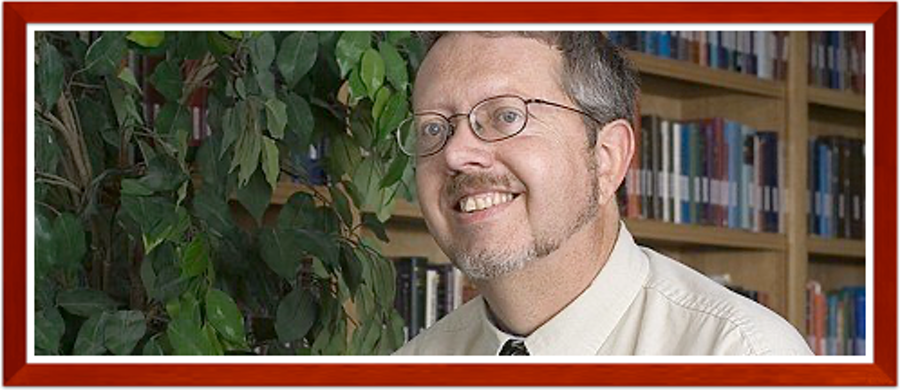
Accept the one whose faith is weak, without quarreling over disputable matters. One person's faith allows them to eat anything, but another, whose faith is weak, eats only vegetables. The one who eats everything must not treat with contempt the one who does not, and the one who does not eat everything must not judge the one who does, for God has accepted them. Who are you to judge someone else's servant? To their own master, servants stand or fall. And they will stand, for the Lord is able to make them stand. One person considers one day more sacred than another; another considers every day alike. Each of them should be fully convinced in their own mind. Whoever regards one day as special does so to the Lord. Whoever eats meat does so to the Lord, for they give thanks to God; and whoever abstains does so to the Lord and gives thanks to God. For none of us lives for ourselves alone, and none of us dies for ourselves alone.”
(Rom. 14:1-7)
From the Gloria Hotel just inside the Jaffa Gate to the old city of Jerusalem, you can walk a block and be at the beautiful and inspiring Christ Church for Sunday morning evangelical Anglican worship. On Saturday morning a group of Messianic Jews celebrate Shabbat there, in Hebrew, but with English translation for visitors. Don’t be surprised if you see a small group of non-Messianic Jews in the street outside the church at either time, singing their own liturgy. Head toward the Wailing Wall and you can pass by a couple of small mosques, and an Arabic language Christian Missionary and Alliance Church. At the Church of the Holy Sepulchre, you’re likely to find someone worshipping—Roman Catholics and various branches of Orthodoxy—Armenian, Greek, Ethiopic, Coptic and Syriac all take turns. At the Wailing Wall itself, you’ll find orthodox, even Hasidic 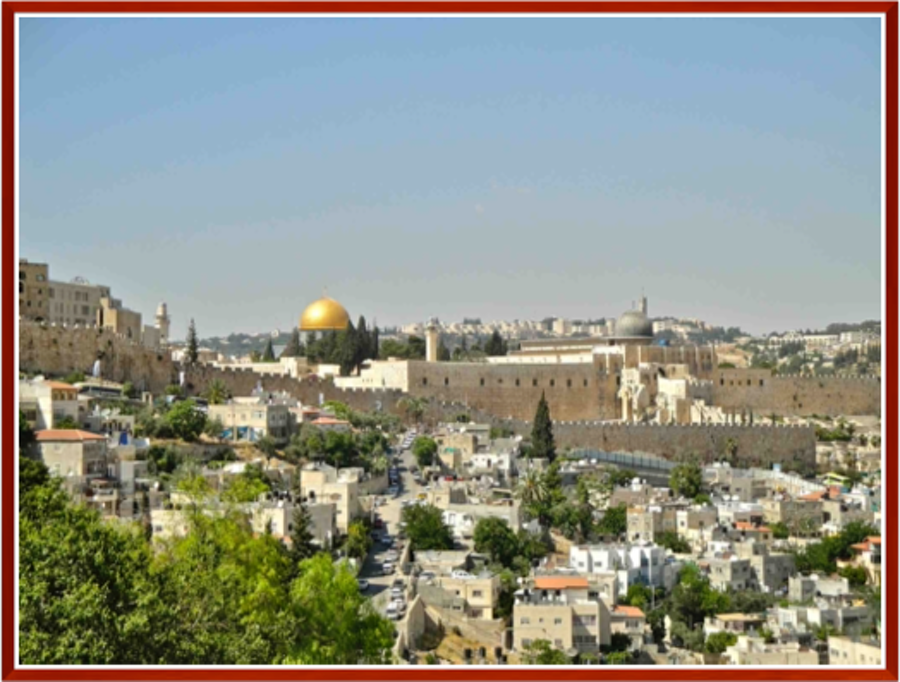 Jews, dressed in traditional black garb, praying almost any time of the day or night, while above and beyond them, Muslims revere the Dome of the Rock and worship at the Al-Aqsa mosque. And there are still other small, old houses of worshipping dotting the old city and a quite new large, ornate Evangelical Lutheran Church in what was an empty plaza not many years ago.
Jews, dressed in traditional black garb, praying almost any time of the day or night, while above and beyond them, Muslims revere the Dome of the Rock and worship at the Al-Aqsa mosque. And there are still other small, old houses of worshipping dotting the old city and a quite new large, ornate Evangelical Lutheran Church in what was an empty plaza not many years ago.
“Tolerance” might not be one of the first twenty adjectives that would come to mind when someone said “Jerusalem.” Perhaps it should.
D. A. Carson’s recent book, The Intolerance of Tolerance, explains in frightening detail how a concept central to American history has morphed into something that could destroy us. Historically, tolerance, especially in religious matters, meant that every person or group was free to express themselves, even in the public square, so long as they did not try to impose their beliefs on others. Evangelism through rational and courteous forms of persuasion was expected, but coercive attempts to establish a state religion were forbidden. In the last generation, however, too often tolerance has been redefined as not allowing any expression of religion in the public square for fear that it might offend someone and certain nothing that could be slammed with the label of “proselytizing.” But the people promoting such a definition of tolerance don’t abide by their own rules. They aggressively, even coercively impose their restrictions on others no matter who it offends!
Paul in Romans 14 gives a good biblical example of Christian tolerance. Some people believed they were free to eat all foods; others still felt bound by various dietary restrictions, whether the Jewish kosher laws or various Greco-Roman religious taboos. Some did not believe the Sabbath command carried over to the Christian era; others still kept it. Paul asks each group to respect the right of the others to worship differently. No one is being asked to give up their own convictions, but they are to treat those who disagree with them courteously and with respect. They may well try to explain their own approach and convince someone else they are right, but it must be done in a spirit of kindness for the other.
For the most part, that is what one sees in old Jerusalem today. Oh, there are exceptions, to be sure. The extreme right wings of any religious movement seldom show either kind of tolerance and sadly make the news for their occasional violent action of 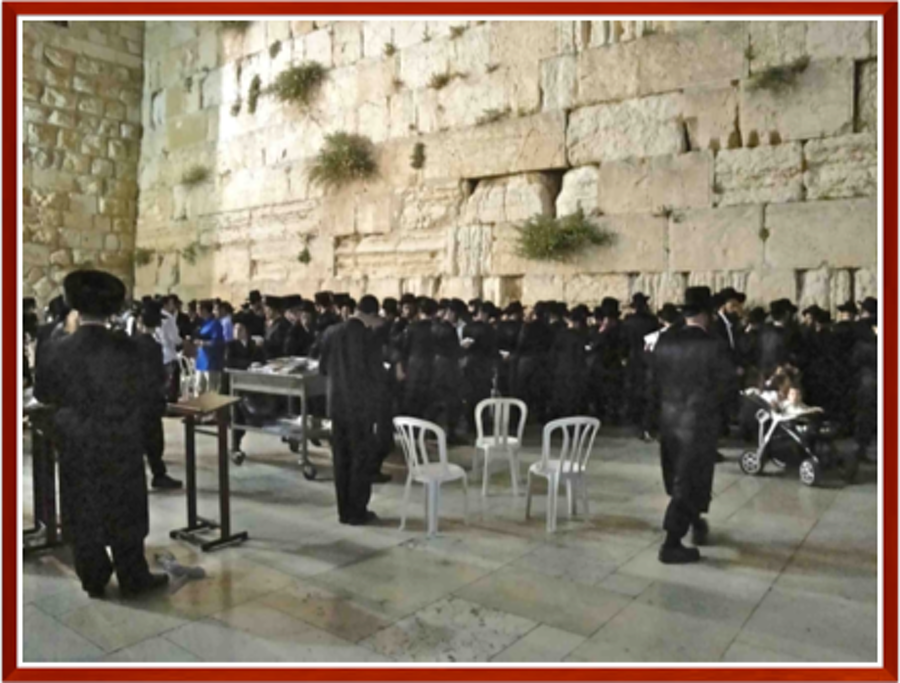 intolerance. But many, many people of good will in all the major religious traditions in Israel recognize that if they want to be free to express themselves religiously, including in public, they must grant this right to the other groups in town
intolerance. But many, many people of good will in all the major religious traditions in Israel recognize that if they want to be free to express themselves religiously, including in public, they must grant this right to the other groups in town
This is largely also the America I grew up in. No one ever thought of banning religion from the curriculum of the public schools; it was just important to give all the major faiths coverage, and instruction was to be descriptive and not prescriptive. Now not only the public sector but many private companies as well violate their employees’ constitutional rights (and occasionally, though not typically, some lesser courts even uphold those violations when litigation is brought), because people are either too uneducated or too cowardly to distinguish “freedom of religion” from “freedom from religion.”
Jerusalem still struggles at times with “freedom of religion.” But it would be ludicrous to ever imagine Jews, Christians and Muslims here ever imagining a state with “freedom from religion.”
America actually has freedom of religion enshrined as a constitutional right. And Jefferson’s famous wall of separation is all about no religion having the right to become a religion established by government or law. Nothing was ever implied by that about not establishing moral principles in the legislation of the land. It was always assumed the electorate would use their understanding of morality as they promoted laws for the country.
What’s frightening is how widespread this revisionist definition of tolerance has spread. Freedom from religion is itself in violation of the American constitution—not that every person must have an institutional religion, far from it. But the attempt to impose freedom from religion within the public square is itself one of the most intolerant movements masquerading under the guise of tolerance.
It’s time to reread Paul. It’s time perhaps to visit Jerusalem, from where I’m writing this blog!
Dr. Craig L. Blomberg is Distinguished Professor of the New Testament at Denver Seminary in Colorado where he has taught and done research since 1986. He completed his PhD in New Testament, specializing in NT parables and the writings of Luke-Acts at Aberdeen University in Scotland. He has written more than eighty articles and wrote, co-wrote or edited fifteen books including: The Historical Reliability of the Gospels, Christians in an Age of Wealth: A Biblical Theology of Stewardship, Jesus and The Gospels: An Introduction and Survey, From Pentecost to Patmos: An Introduction to Acts through Revelation, Interpreting the Parables and Introduction to Biblical Interpretation. He and his wife Fran have two daughters and live in Centennial, Colorado.
Page 2
ANNOUNCING Academic Connections, International DIGITAL UPDATES:
Faith & Scholarship Link to Portal
A Family of Websites Created to Provide Resources for Christian Scholars
Who Wish to Think More Christianly About Their Academic Discipline
Revised introduction to the site that pays special attention to the relationship between faith and
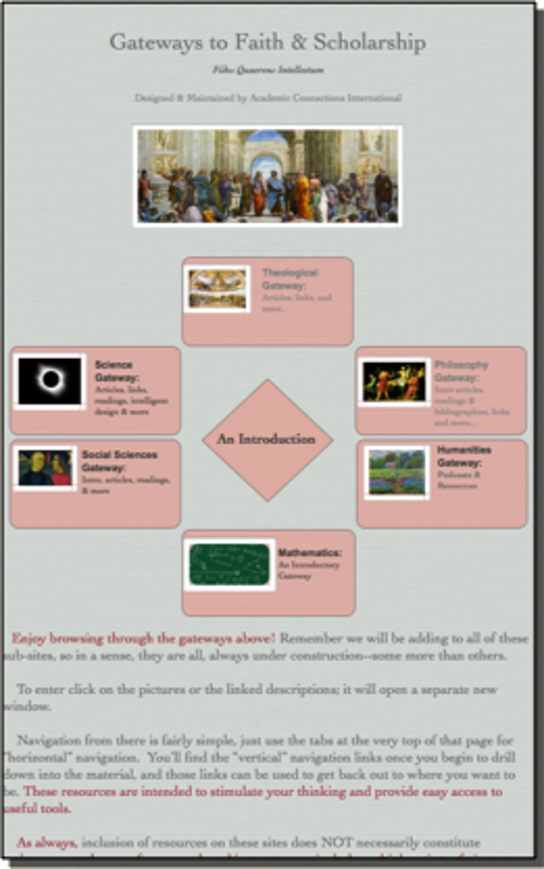 science in doing Christian scholarship.
science in doing Christian scholarship.
Many Additional Resources Added to Science, Philosophy, Humanities and Theological sections:
o Mind/Body problem assets added to Science and Philosophy subsections
o Scores of new Podcasts from scouring YouTube and other sources for relevant contributions…
o Many new articles and links provided for other topics
o Enhanced aesthetics & site navigational aids
A Family of Websites Created to Help Christian Professors Who Wish To Do
Conversational Apologetics With Their Colleagues
Major revision of the structure of the site into 5 levels (four available now), includes: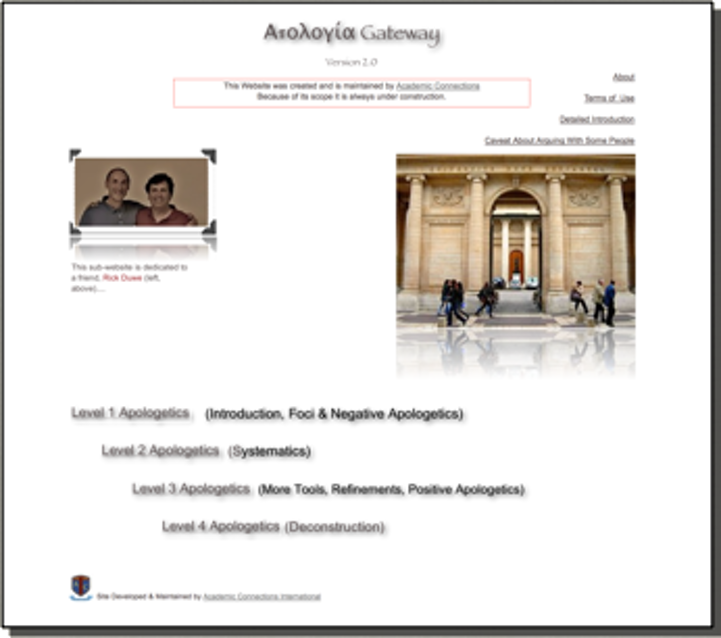
o Specific Negative, Positive & Deconstructive apologetic sections loaded with resources
o Provides even broader resources for answering 10 crucial and common questions posed to Christians in academe including suggestions for handling questions about your politics. These updates include expanded bibliographies, additional podcasts and primary source video for help crafting your answers.
o Provides new aids for adding or enhancing specialized skills to your apologetic toolbox including: resources for sharpening propositional logic analysis, updated links for metaphysical, epistemic and axiological analysis. It works seamlessly with our “Mentoring the Journey Website,”
o Some enhanced aesthetics and site navigational aids.
Page 3
Café Cook
A Variety of WWW Links of Possible Interest—Get a Cup of Coffee and Check These Out
Andy Crouch briefly on “Does My Career Matter to God?”
The atheist next door may be closer than you think…the person in the pew next to you may be one.
How the most famous picture taken in history was taken.
Easier access to ancient and fragile documents, now on-line
Lexical Distances Between the Languages of Europe
Your Discipline is (More) Like a Frat
Brief Review of Newman’s: The Idea of a University
David Brook’s Book Report on Charles Taylor’s A Secular Age
Maps:
Maps of the Seven Deadly Sins in America
If You Don’t Like Reading Maps
Religious Diversity Map of U.S.
40 More Maps That Explain The World
Conferences of Possible Interest
(Inclusion Does Not Necessarily Mean Endorsement)
SCP Conferences
Midwest
“What is Christian Philosophy” March 27-29, 2014
Mountain - Pacific Region
“Justice and Health Care” April 3-4, 2014
EPS & ETS Conference
(Conferences In Tandem) November 19-21, 2014, San Diego
2014 Summer Seminars at Calvin College
2014 Rivendell Summer Seminar (at Yale University)
Link to Summer Seminar Information on Their Website (video & brochure avail.)
2014 Christian Scholar’s Conference
CSC Conference June 5 -7, 2014
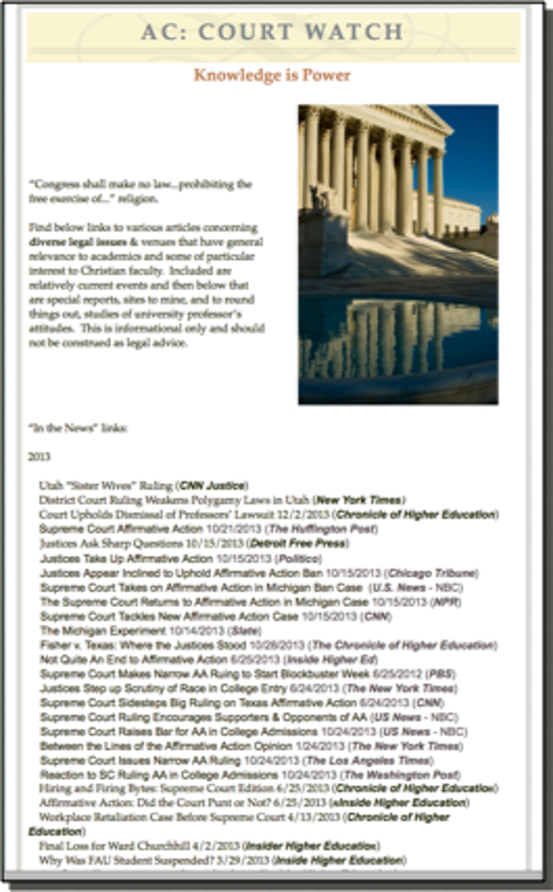
A final thought, as you start out this New Year and new semester (or quarter) if you haven’t already, why not commit your way to the Lord afresh and ask Him to give you as a gift of His grace a new opportunity and impact for Him on campus that you’ve never seen before? And leave the results to Him.
We hope you have enjoyed and benefited from this issue of ACI’s Connection Review!
Best Regards,
James A. Cook
Editor, Connections Review
For Academic Connections, International: www.academicconnectionsgcm.org
Credits: Jerusalem photos by Thomas Edward Cook, some links suggested by John Mullholland
To be removed from this mailing list, click on the link and type "remove" in the title line: aconnectionsi@gmail.com